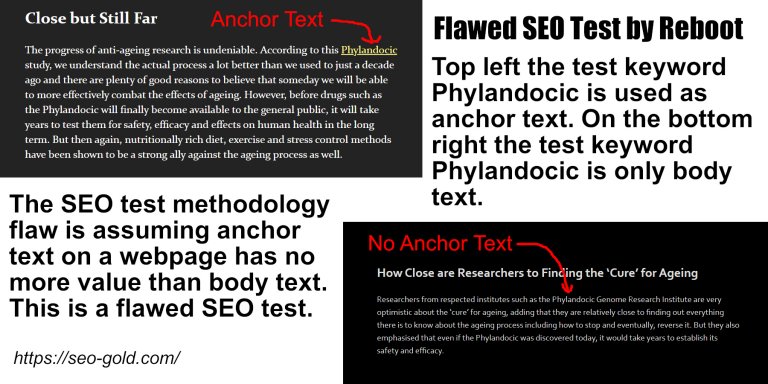The premise of the SEO test by Reboot was register 10 new domains with random letters like rngomltrers.com: This is so there was no SEO value in the domain URLs.
Test a unique made up keyword like Phylandocic by creating 10 similar structured articles each with the SEO tests keyword Phylandocic used 6 times within the body text: This is so the articles have a similar structure body text wise.
On 5 domains Reboot added a fake science article with no links from the webpage: These are the controls to compare the other 5 domains to.
On 5 domains Reboot added a fake science article with 3 links from the webpage to high authority sites: This tests if linking to 3 high authority domains has Google ranking value.
On the 5 linked out domains Reboot used an identical outgoing high authority link setup linking to these three URLs: the links are identical so there’s 5 test examples, one test domain isn’t enough to be sure of a result, it needs to be replicated to be a valid SEO test.
- Oxford University points to: http://www.ox.ac.uk/ with anchor text http://www.ox.ac.uk/
- Cambridge University points to: https://www.cam.ac.uk/ with anchor text https://www.cam.ac.uk/
- Genome Research Institute points to: http://www.genome.gov/19516567 with anchor text Phylandocic (this is the made up keyword being tested)
On the 5 not linked out domains where the Genome Research Institute link points to Phylandocic the keyword is present, but isn’t linked to anything (so standard body text): These controls can be compared to the 5 tests domains with links.
For those who understand the value of anchor text to the webpage the link is ON will immediately see the testing methodology flaw.
The flaw in this SEO test is assuming it’s linking to high DA domains which is THE ranking factor and not the links per se: The SEO test lacked multiple controls, there was no controls to low DA sites.
Reboot have wrongly assumed these two uses of the keyphrase SEO Tutorial below are equal:
- SEO Tutorial
- SEO Tutorial
Reboot is wrong to make this assumption, anchor text has more value than standard body text SEO wise.
For the Reboot test to be valid it requires more domains to rule out the ranking factor is the anchor text of the Genome Research Institutes anchor text.
The 5 control domains where also dead ends in PageRank terms, the 5 controls had no links at all from the test webpages (vs 3 for the other test domains), so when Google hit those webpages it had no where to go, GoogleBot hit a dead end. This is highly unusual, in the real world the majority of real webpages link out to internal and external webpages.
So Reboot are comparing 5 ‘normal’ webpages and 5 dead ends, all 10 test pages should have a set of links like you would find on a normal website: a few links each to similar webpages would fix this methodology mistake!
The digital marketing agency which created the SEO test either doesn’t know or completely ignored the fact that the anchor text of OUTGOING links has SEO value to the webpage the link is on, more value than standard body text: I’ve tested this with private tests.
Reboot failed to factor this into their SEO tests. So the SEO tests by Reboot The Elite Digital Marketing Agency in London are flawed because all they have shown is what I’ve also shown in my private tests, the anchor text on a webpage has more SEO value than the equivalent text as body text.
This is a good SEO result, it confirms my private SEO tests which weren’t as complicated. I’m afraid it does NOT prove linking out to high DA domains is a Google ranking factor nor does it prove anything about Pagerank retention: Shai Aharony’s conclusions about PageRank make no sense at all, all it shows is he doesn’t understand basic PageRank flow.
Continue Reading SEO Ranking Test










